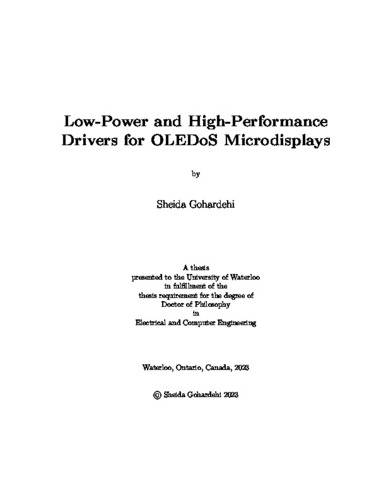| dc.description.abstract | The rapid growth of the microdisplay market, driven by the demand for smartwatches, head-mounted displays in Virtual Reality (VR) and Augmented Reality (AR), and other portable devices, has presented a need to enhance their energy efficiency. This thesis focuses on reducing the power and energy consumption of microdisplays while maintaining display luminance, and image quality; and enhancing key features such as resolution, refresh rate, and color depth.
First, a novel driving method and pixel circuit are proposed that reduces the number of subframes in a digitally-driven display. The dual-driver method offers flexibility in different design modes, allowing for the enhancement of various display characteristics. In the low-power mode, the operating frequency is reduced, resulting in decreased dynamic power consumption by the drivers. Experimental results on a proof-of-concept array fabricated using TSMC 65 nm technology demonstrate a significant 39% reduction in power consumption compared to a conventional array. Furthermore, designing the display in other modes yields remarkable improvements, with up to 8.5 times enhancement in refresh rate or resolution. In addition, the high color depth mode presents an opportunity to increase color depth from 8 bits to 14 bits, enhancing the visual experience.
Additionally, this thesis investigates power reduction techniques specific to row drivers in microdisplays. Circuit techniques are proposed to recycle energy in the row driver, thereby reducing dynamic power consumption. Measurement results on proof-of-concept arrays implemented in TSMC 65 nm technology reveal substantial reductions of up to 30% in the power consumption of the row driver using different energy recycling techniques. Applying these techniques led to a significant reduction in the dynamic power consumption of the row driver. For instance, employing the direct energy restoration technique resulted in a remarkable decrease of over 45% in the dynamic power consumption of the row driver.
Finally, a digital data driver with a data energy recycling feature is presented to further reduce the dynamic power consumption of microdisplays. Measurement results obtained from a proof-of-concept array fabricated using TSMC 65 nm technology demonstrate an average power consumption reduction of 16% in the display’s data driver when subjected to randomly generated test images.
This thesis addresses the pressing need for energy-efficient microdisplays, offering innovative driving methods, pixel circuit design, and dynamic power reduction techniques. The proposed solutions provide significant power savings while preserving display quality and enabling enhancements in resolution, refresh rate, and color depth, contributing to extended battery life and improved user experience in portable electronic systems. | en |

